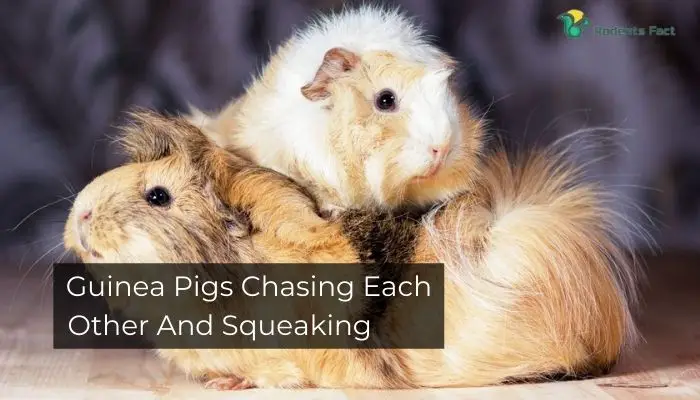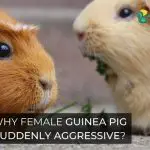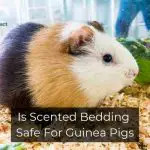Why Are My Guinea Pigs Chasing Each Other And Squeaking?
Guinea pigs have a strong sense of community. Understanding this is critical since it is known that guinea pigs do not thrive when they are left alone. So, what does it mean guinea pigs chasing each other and squeaking?
Squeaking is distinct; frantic, loud, and a little threatening, to say the least. The fact that they are expressing their displeasure is obvious.

If you go to the cage, you may see two guinea pigs chattering their teeth, pursuing, or biting each other. Playing involves chasing, humming, and smelling.
Any biting, lunging, or bloodshed is called fighting. Step in and begin taking cautious action at this time.
Why are guinea pigs chasing each other and squeaking?
Guinea pigs chase each other and squeak to establish dominance in the group. This is completely normal and a means for the animals to communicate with each, so you shouldn’t be alarmed.
Additional signs of dominance and bonding behaviors to look for in guinea pigs include raising the heads high, rumbling, teeth chattering, mounting, and humping.
In simpler words, establishing dominance for these animals appears like fighting. Many Guinea pig owners usually mistake this for fights/aggression and end up separating them, thereby disrupting a 100% healthy natural process.
Note that the show of dominance happens not only between males and females but also between females and female individuals.
In some instances, the guinea pigs may chase each other while squeaking due to excitement. This is epically true if the animal lets out a high-pitched squeak or scream; this means she’s quite happy about something, say feeding or playing.

But a squeak could also be a cry for help for your guinea pig. It may be feeling discomfort or pain and thus screaming for help.
Check whether the guinea pig is in any pain or if another individual is trying to encroach in its favorite area to snooze.
You may want to monitor the behavior of the animals to see if there are signs of aggression and fighting.
If they’re not getting along well or one of them appears to be overly aggressive and dominant, then you should separate them to keep them from injuring each other.
Guinea Pigs Chasing Each Other Meaning
Dominance can appear to be a form of combat, but it is especially common and can occur quite frequently.

Typical bonding and dominance behaviors include chasing each other, raising their heads high, and engaging in behaviors like teeth chattering, rumbling, and mounting.
Is it normal for guinea pigs to chase each other?
It is absolutely normal for guinea pigs to chase each other, and this is usually a show of dominance. The dominant individual usually chases the other individual around the cage and then nips at their back.
When the Guinea pigs finally catch up with the one they’re chasing, they may mount and hump each other as another way to show dominance.
This usually happens with the males or when you introduce two new pigs together.

Females also tend to mount and hump fellow female cage mates to display dominance, though they may also do it when on heat.
As we said above, most pig owners mistake this 100% natural behavior for a sign of aggression and start separating their pets.
However, we advise against rushing things. Take your time to observe the behavior of your cute little pets and only act if you’re 100% sure they aren’t getting along well.
Guinea Pigs Squeaking Meaning
When a guinea pig is in discomfort or in need of assistance, it may scream. Occasionally, another guinea pig is encroaching on his preferred place to snooze.
If you hear a scream from your guinea pig, pay attention since it might mean that they are in pain and need your assistance.
When your guinea pig makes a high-pitched scream or squeak, it is likely that he or she is happy about something, such as feeding time or playing.
Are My Guinea Pigs Fighting Or Playing?
Guinea Pig Bonding Can Seem Like Fighting
Sometimes guinea pigs’ bonding might appear like they are fighting. By their actions, it looks like they do not like one other. Normal guinea pig behavior, but you can tell. Bonding might be hard to see.
Establishing Dominance Can Seem Like Fighting
Trying to establish authority might be confused with fighting. This fighting-like behavior is normal, much like their bonding.

Because this appears like fighting, guinea pig owners may separate them, disrupting the natural process.
Normal Bonding And Dominance Behavior
Guinea pig shows some of this behavior when socializing-
- Humping
- Rising head
- Chasing one another
These are frequent guinea pig bonding and dominance activities.
Two guinea pigs are sure to fight at some point, although it is not considered true fighting.
Guinea pigs can coexist peacefully if everything goes according to plan. If they do not appear to get along, do not panic; guinea pigs require their own place the vast majority of the time. They play when they want.
Let’s see guinea pigs’ behavior here:
When Your Guinea Pigs Are Just Playing?
Guinea pigs that are having a good time are simple to see. Please remember to include playing or dating in your description of their social game.
If two guinea pigs are in a good mood, they will whistle and purr in addition to a variety of other vocal and physical expressions.
Playing with toys and running about the cage may also be fun for guinea pigs if they enjoy each other.
Best to let the guinea pig all alone pretend nothing is wrong.
When Your Guinea Pigs are Actually Fighting?
To determine whether or not guinea pigs are fighting, you must be aware of a number of factors and repercussions.
First, when there is blood or a significant injury, isolate them quickly. As a result of fighting behavior, this is what happens. Other forms of combative conduct include, but are not limited to:

- Intentional bites each other.
- Full-force guinea pig attack
- Teeth gnashing that is obnoxiously loud and forceful.
- Physical battles
Frequently Asked Questions
1. Why Are My Guinea Pigs Squeaking And Chasing Each Other?
If one piggie has staked itself in a nice location on a bed, beneath a cozy hidey, or just in the middle of a delectable-looking cluster of hay, it is a good sign that they are trying to establish themselves as the herd leader.
2. How Can I Tell If My Guinea Pigs Are Fighting Or Playing?
Guinea pigs that are delighted with each other will whistle and purr.
Certain factors or outcomes may indicate if guinea pigs are fighting. Other fighting behaviors:
- Intentional bites
- Full-force guinea pig attack
- Full-blown physical conflicts, violent teeth chattering
3. How Do You Tell If My Guinea Pigs Are Getting Along?
Look for indicators your guinea pigs are getting along. Noises and interactivity will abound. Sometimes sniffing, chasing, then relaxing and grooming.
4. How Long Does It Take Guinea Pigs To Bond With Each Other?
When you pair a young guinea pig with another (young or elderly), the younger guinea pig may challenge the other for top guinea pig rank throughout its teenage stage (3-5 months).
Conclusion
This is all you need to know about guinea pigs chasing each other and squeaking. Guinea pigs are socially complex. They portray animal behavior like an alpha male or a guy battling for a female.
For the most part, you will have little trouble keeping one male and one female as pets. Males are most likely to fight, but it is unlikely. When guinea pigs fight, it is serious. Check for injuries after a fight. If the fighting gets too severe, see your vet so your guinea pigs stay healthy.




